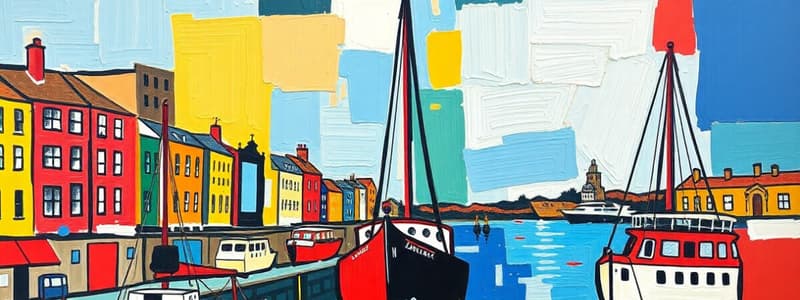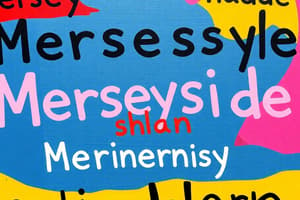Podcast
Questions and Answers
In which country is Liverpool located?
In which country is Liverpool located?
- Wales
- Scotland
- Ireland
- England (correct)
Liverpool is located on the eastern side of which estuary?
Liverpool is located on the eastern side of which estuary?
- River Thames
- Bristol Channel
- Mersey Estuary (correct)
- River Severn
In which year was Liverpool granted city status?
In which year was Liverpool granted city status?
- 1920
- 1750
- 1880 (correct)
- 1207
Historically, Liverpool was part of which county?
Historically, Liverpool was part of which county?
Which factor significantly contributed to Liverpool's economic growth in the 18th century?
Which factor significantly contributed to Liverpool's economic growth in the 18th century?
By the 1840s, Liverpool was a major port for which type of traffic?
By the 1840s, Liverpool was a major port for which type of traffic?
Which event led to a rapid increase in Liverpool's population, particularly with Irish migrants?
Which event led to a rapid increase in Liverpool's population, particularly with Irish migrants?
Liverpool was the European Capital of Culture in which year?
Liverpool was the European Capital of Culture in which year?
Liverpool is situated on a ridge of what type of hills?
Liverpool is situated on a ridge of what type of hills?
Approximately how far is Liverpool city centre from the Irish Sea?
Approximately how far is Liverpool city centre from the Irish Sea?
What is the approximate population of Liverpool?
What is the approximate population of Liverpool?
Liverpool is well known for which aspect of its culture?
Liverpool is well known for which aspect of its culture?
What is the name of the distinctive dialect spoken in Liverpool?
What is the name of the distinctive dialect spoken in Liverpool?
Which famous music venue in Liverpool is associated with The Beatles?
Which famous music venue in Liverpool is associated with The Beatles?
What type of race is held annually at Aintree Racecourse in Liverpool?
What type of race is held annually at Aintree Racecourse in Liverpool?
Which of these buildings can be found on Liverpool's Waterfront?
Which of these buildings can be found on Liverpool's Waterfront?
Name one of the cathedrals located in Liverpool.
Name one of the cathedrals located in Liverpool.
Which airport serves Liverpool?
Which airport serves Liverpool?
What is the primary basis of Liverpool's economy?
What is the primary basis of Liverpool's economy?
Which of the following is a mode of public transportation available in Liverpool?
Which of the following is a mode of public transportation available in Liverpool?
Flashcards
Liverpool
Liverpool
City in Merseyside, England, on the Mersey Estuary's eastern side.
Liverpool's Founding/Status
Liverpool's Founding/Status
Borough status achieved in 1207; city status in 1880.
18th Century Trade Impact
18th Century Trade Impact
Trade from West Indies, Ireland, and Europe boosted growth.
19th Century Trade Expansion
19th Century Trade Expansion
Signup and view all the flashcards
Economic Changes (20th Century)
Economic Changes (20th Century)
Signup and view all the flashcards
Liverpool's Geography
Liverpool's Geography
Signup and view all the flashcards
Liverpool's Climate
Liverpool's Climate
Signup and view all the flashcards
Liverpool Demographics
Liverpool Demographics
Signup and view all the flashcards
Liverpool's Economy
Liverpool's Economy
Signup and view all the flashcards
Liverpool's Culture
Liverpool's Culture
Signup and view all the flashcards
Liverpool Landmarks
Liverpool Landmarks
Signup and view all the flashcards
Liverpool's Football Teams
Liverpool's Football Teams
Signup and view all the flashcards
Grand National
Grand National
Signup and view all the flashcards
Liverpool Dialect
Liverpool Dialect
Signup and view all the flashcards
Royal Albert Dock
Royal Albert Dock
Signup and view all the flashcards
Liverpool Waterfront
Liverpool Waterfront
Signup and view all the flashcards
St. George's Hall
St. George's Hall
Signup and view all the flashcards
Liverpool Cathedrals
Liverpool Cathedrals
Signup and view all the flashcards
Cavern Club
Cavern Club
Signup and view all the flashcards
Liverpool Transportation
Liverpool Transportation
Signup and view all the flashcards
Study Notes
- Liverpool is a city in Merseyside, England.
- The city is located on the eastern side of the Mersey Estuary.
- Liverpool was founded as a borough in 1207.
- Liverpool was granted city status in 1880.
History
- Historically a part of Lancashire, its urbanisation and expansion were largely brought about by the city's status as a major port.
- By the 18th century, trade from the West Indies, Ireland and Europe coupled with the developing Atlantic slave trade contributed to the city's economic growth.
- In the early 19th century, Liverpool's trade expanded significantly with the opening of extensive canal and rail links to the interior.
- By the 1840s, Liverpool was a major port for passenger and freight traffic.
- Liverpool's population grew rapidly, especially with Irish migrants due to the Great Famine.
- By the start of the 20th century, Liverpool exerted immense economic influence and was renowned for its architecture, particularly the Liver Building, Cunard Building and Port of Liverpool Building.
- The city suffered substantial economic decline in the mid-20th century, with the docks and manufacturing industries going into decline.
- The 1980s saw high unemployment and social unrest.
- However, since the mid-1990s Liverpool has experienced significant economic regeneration.
- Liverpool was the European Capital of Culture in 2008.
Geography
- Liverpool is located in North West England.
- The city is situated on the eastern side of the Mersey Estuary.
- The city centre is about 5 miles (8 km) from the Irish Sea.
- The city is built across a ridge of sandstone hills rising up to around 230 feet (70 m) above sea-level at Everton Hill.
- Liverpool's climate is temperate, with relatively mild summers and winters.
- Rainfall is fairly evenly distributed throughout the year.
Demographics
- Liverpool has a population of over 500,000 people.
- The city is the fifth-largest in England.
- Liverpool is a diverse city, with a significant population of people of Irish descent.
- There are also long-established Chinese and Welsh communities.
Economy
- Liverpool's economy is largely based on services.
- The city has a large port, which is one of the busiest in the United Kingdom.
- Tourism is also a major industry, particularly since the city was named European Capital of Culture in 2008.
- Liverpool is also home to a number of universities and colleges, which contribute to the city's economy.
Culture
- Liverpool is known for its culture, particularly its music scene.
- The city is the birthplace of the Beatles.
- Liverpool has a number of museums and galleries, including the Tate Liverpool and the Walker Art Gallery.
- The city also has two cathedrals: Liverpool Cathedral and Liverpool Metropolitan Cathedral.
- Liverpool is home to two Premier League football clubs: Liverpool and Everton.
- The Grand National horse race is held annually at Aintree Racecourse.
- Liverpool has a distinctive dialect known as Scouse.
Landmarks
- Royal Albert Dock: A complex of dock buildings and warehouses.
- Liverpool Waterfront: Includes the Pier Head with the Liver Building, Cunard Building, and Port of Liverpool Building.
- St. George's Hall: A neo-classical building.
- Liverpool Cathedral: An Anglican cathedral.
- Liverpool Metropolitan Cathedral: A Roman Catholic cathedral.
- Cavern Club: A music venue famous for its association with The Beatles.
Transportation
- Liverpool has an extensive public transportation network.
- Includes buses, trains, and ferries.
- Liverpool John Lennon Airport offers domestic and international flights.
- The city is connected to the national rail network.
- Merseyrail is a local rail network serving the Liverpool area.
Studying That Suits You
Use AI to generate personalized quizzes and flashcards to suit your learning preferences.

